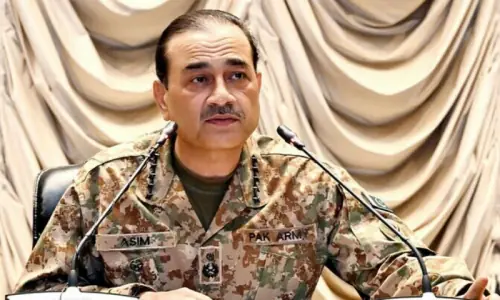ISLAMABAD: Pakistan’s President Asif Ali Zardari Tuesday vowed to revamp his Pakistan People’s Party (PPP) after stepping down as president of the country on September 9.
Highly reliable sources in the PPP told Dawn.com that the president, while meeting with senior leaders of the party including Chief Minister Sindh Syed Qaim Ali Shah, said he would devote himself towards making the party active again.
Alluding his post-September 9 plan, the president told the party leaders that he will visit all districts of Sindh province in the first stage followed by visits in Punjab.
Zardari did not seek re-election at Tuesday's vote for a new ceremonial head of state and his PPP is staring at a future of deep uncertainty.
The candidate of ruling Pakistan Muslim League-Nawaz (PML-N), Mamnoon Hussain has been elected as the 12th President of Pakistan.
Senior PPP leader and former home minister Sindh, Manzoor Wasan told Dawn.com that the president rebutted all speculations citing him leaving the country after stepping down as president.
Wasan quoted President Zardari as saying that he did not leave the country in adverse circumstances and vowed not to do so in the coming future also.
The PPP government was the first in Pakistan's history to complete a full five-year term and transfer power at the ballot box. But after a rudderless campaign, the party lost badly on polling day in May.
Zardari was credited with wheeling and dealing to keep the PPP in power for its full term – helped by the army chief of staff keeping to the sidelines and the opposition's unwillingness to force early elections.
The Pakistani president is supposed to be apolitical and Zardari no longer has an official role in the PPP, though many see him as still the most influential string-puller behind the scenes.
Senior PPP figure and former information minister Qamar Zaman Kaira said he would take the party forward after leaving office.
“He may not take part in practical politics because of the (constitutional) two-year bar, but that does not prevent him from advising and guiding his party,” Kaira said.
Zardari is rarely seen in public in Pakistan and many observers expect him to spend much of his time abroad, concerned for his personal security and possible criminal proceedings at home. Analyst Hasan Askari warned his prolonged absence could have repercussions as the PPP, weakened and divided, seeks to rebuild from its election drubbing.
“If Asif Ali Zardari will be shuttling between Karachi and Dubai then he will not be as effective a leader for the PPP as the party needs at the moment,” Askari told AFP.
“That will create problems for the PPP because there is a crisis of leadership in the party.”
Zardari's son Bilawal is PPP chairman but is too young to stand for parliament until September and is seen as a reluctant heir to the political legacy of his murdered mother, Benazir Bhutto.
He is young and inexperienced, and would need the experienced hand of his father to guide him, said Askari. “If Zardari is not settled in Pakistan, then he will not be able to provide that support to Bilawal.”
Born on July 26, 1955 into a land-owning, polo-playing family from southern province Sindh, Zardari was educated in Pakistan and studied business in London, although he never graduated from university.
Barely known at the time of his arranged marriage to Bhutto in 1987, he carved out a powerful position for himself, serving as a government minister during his wife's two short-lived premierships.
After her first administration, he was jailed in 1990 for three years and was back behind bars within half an hour of her second government's dismissal in 1996, held for eight years for alleged corruption, murder and drug smuggling.
He has always claimed the allegations were politically motivated and he has never been formally charged or put on trial.
During his presidency the 57-year-old Zardari withstood enormous pressure from a judiciary determined to put him on trial for corruption, sacrificing his first prime minister.
The allegations dated back to the 1990s, when he and Bhutto stood accused of using Swiss bank accounts to launder $12 million allegedly paid in bribes.
While in office Zardari claimed immunity from prosecution as head of state, but he is likely to face a renewed threat of being pursued through the Pakistani courts when he steps down.
Swiss prosecutors said last month that no new evidence had emerged since the case against Zardari was dropped in 2008, meaning they could not reopen the investigation.
In addition, the fact that the alleged offences took place more than 15 years ago meant that the statute of limitations had expired, they said.

































